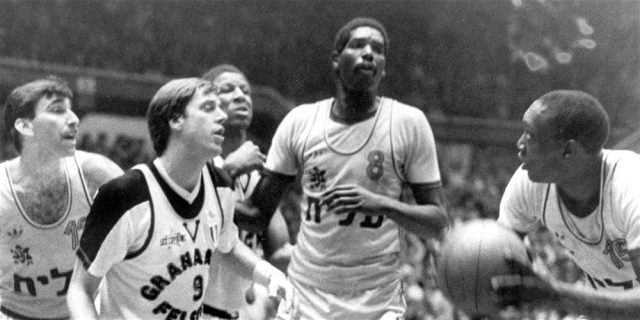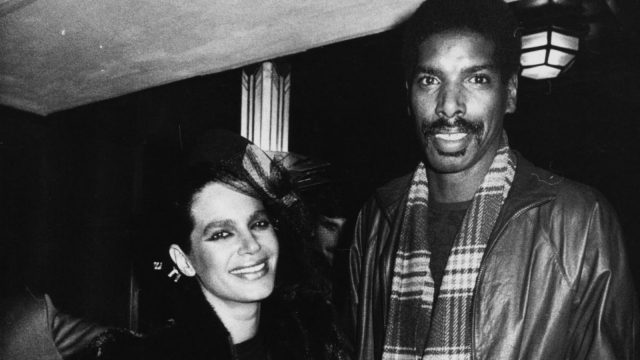
The life and times of Aulcie Perry on and off the court are documented in New York Jewish Film Festival opener
AULCIE (Dani Menkin, 2019)
Walter Reade Theater, Film at Lincoln Center
165 West 65th St. between Broadway & Amsterdam Aves.
Thursday, January 16, 8:30
Festival runs January 15-28
212-875-5050
www.filmlinc.org
thejewishmuseum.org
Israeli director Dani Menkin follows up his 2016 documentary, On the Map, about Maccabi Elite Tel Aviv’s unlikely victory in the 1976-77 European Champions Cup, with an inside look into the life of one of its stars in Aulcie, the opening night selection of the New York Jewish Film Festival. After being the last man cut from the New York Knicks in 1976, Newark native Aulcie Perry was recruited to play for Maccabi in Israel, where the 6-10 black man — an unusual sight in the Land of Milk and Honey — quickly became a superstar, helping the team to championships, falling in love with top model Tami Ben Ami, and hanging out in hot clubs, living the high life. But it all came tumbling down in a haze of drugs, and Menkin traces Perry’s attempt to put it all back together, primarily by finding the daughter he has not seen since she was a baby.
The film is set up as Perry’s confession to that daughter, Cierra Musungay. “I always knew one thing: that I wanted to tell you my story, the way it is, with the good and the bad,” he says at the beginning. “So where do I start? People say you start at the beginning. But I wanted to start at the end, or when I thought the end was coming.” He was inspired to track her down after facing a serious health scare. “I think, that only when I almost died, I started to really live. And that’s when I wanted to find you and, maybe in some ways, find myself,” he adds.

Top model Tami Ben Ami and basketball superstar Aulcie Perry are shown as the hot couple in Aulcie
Menkin goes back and forth between archival footage, animation by Assaf Zellner, and interviews with Aulcie’s sister Bernadine Lewis, his friends Wayne Tyre and Roy Young, his ex-girlfriend Juanita Jackson, his son Aulcie Perry Jr., and many men from his Maccabi family, including former teammates Earl Williams and Tal Brody, team president Shimon Mizrahi, co-owner Oudi Recanati, coach Zvi Sherf, and manager Shamluk Maharovsky, who was like a father to him. “In Israel, there wasn’t that much prejudice against black players, and he felt at home here,” NBA commentator Simmy Reguer says. “Aulcie came in like a blessing from the gods,” fellow Jersey native and team captain Brody recalls. And Sports Illustrated writer Alexander Wolff explains, “At Maccabi Tel Aviv, Aulcie Perry was Michael Jordan, Kareem Abdul-Jabbar rolled into one.”
Now sixty-nine, Perry is honest and forthright thorughout, admitting his failings and wanting to make up for lost time. He makes no excuses for his precipitous fall, and he’s not seeking sympathy. He’s a man who made mistakes and wants a chance to set things right. Aulcie is a cautionary tale of redemption with heart and soul, focusing on the need to be part of a family, no matter how different and unexpected it may be. Aulcie is having its New York City premiere January 16 at 8:30 at the Walter Reade Theater, with Perry, Menkin, and producer Nancy Spielberg (brother of Steven) participating in a Q&A. Aulcie might be the opening selection of the New York Jewish Film Festival, but the twenty-ninth annual fest actually kicks off a day earlier with Picture of His Life, a documentary codirected by Menkin and Yonatan Nir about Yom Kippur War veteran and underwater photographer Amos Nachoum, showing on January 15 at 1:00, with Menkin, Spielberg, and Nachoum present. A joint presentation of Film at Lincoln Center and the Jewish Museum, the festival continues through January 28 with such other works as Marceline Loridan-Ivens’s centerpiece The Birch Tree Meadow, starring Anouk Aimée and August Diehl, a fiftieth anniversary presentation of Vittorio De Sica’s The Garden of the Finzi-Continis, and Dror Zahavi’s closing night selection, Crescendo, about an attempt to establish an Israeli-Palestinian youth orchestra.